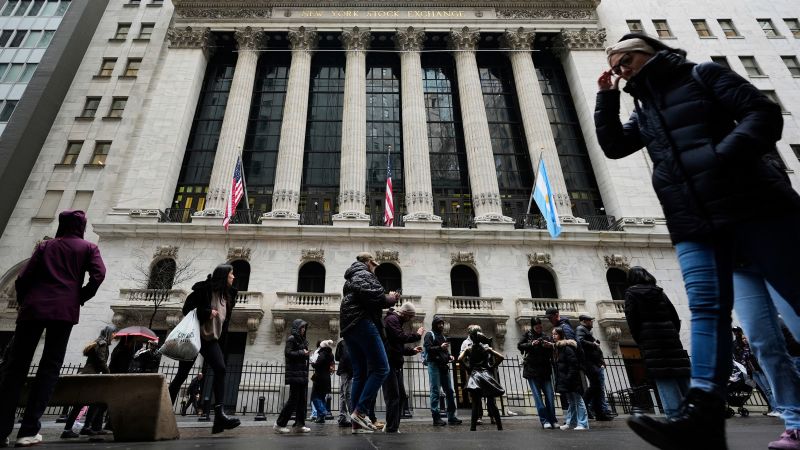A version of this story appeared in CNN Business’ Nightcap newsletter. To get it in your inbox, sign up for free here.
New York
CNN
—
There are two conflicting messages coming from the White House in recent days:
The tariffs are real, and there will be no negotiating, period.
Look, we’re not going to rule out making deals.
On Monday morning, White House trade adviser Peter Navarro penned an op-ed in the Financial Times saying that you shouldn’t hold your breath for any exemptions or deals.
One chaotic trading day later, Treasury Secretary Scott Bessent went on CNBC and said, “I think we can end up with some good deals” if countries come to the table with “solid proposals.”
(Bessent isn’t the only Trump advisor butting heads with Navarro. Elon Musk on Tuesday tweeted that “Navarro is truly a moron,” because apparently we live in a country run by the Real Housewives of the West Wing.)
Anyway, the White House’s apparent openness to some tariff flexibility was enough to shift the mood — for a while, anyway — on Wall Street, which, after three straight trading days of losses, was ready to go bargain shopping. Stocks opened more than 3% higher Tuesday morning.
Of course, it’s important to remember that volatility in the market goes both directions. Stocks often briefly rebound in moments of great uncertainty. It’s called, in the colorful parlance of the investing world, a dead cat bounce. (The idea is even a dead cat will bounce if it falls fast enough from a great enough height. It’s also known as a sucker’s rally, because it’s usually not based on anything substantive.)
Sure enough, the cat bounced. Then, to add to the animal metaphors, the bears roared back.
The morning rally got completely wiped out by late afternoon as investors were slapped in the face with news that the White House would tack on an extra 50% tariff on China. For those keeping track at home, that’s 104% in new tariffs on China under Trump’s second term. (And with apologies for all the math: When you add that to the US’s existing tariffs on China, the total average tariff US imports from the world’s second-largest economy will come to nearly 125%. Considering how much stuff Americans buy from China, Wall Street was right in freaking out.)
The exorbitant China tariffs are only compounding concerns about a shock to supply chains that could push the US (and possibly the world) into a recession. That anxiety isn’t helped by the fact that businesses and investors don’t know which of the various adviser opinions Trump will ultimately listen to.
Here’s a smorgasbord of mixed messages from Trump aides in just the last day:
“Heck of a lot of concessions on the table,” said Kevin Hassett, the director of the National Economic Council, on Fox News early Tuesday.
A few hours later, US Trade Representative Jamieson Greer told lawmakers that the president “does not intend to have exclusions and exemptions.”
Greer then said the president’s “strategy is already bearing fruit” and that nearly “50 countries have approached me to discuss the President’s new policy and explore how to achieve reciprocity.”
On Tuesday afternoon, White House press secretary Karoline Leavitt said Trump had instructed his trade team to make “tailor-made” deals.
And here’s what Trump said when asked about the mixed messaging Monday:
“It could be, they can both be true. There can be permanent tariffs, and there can also be negotiations because there are things that we need beyond tariffs.”
If you’re a business owner or a banker, that’s the clear-as-mud guidance you’re living by right now.
Bottom line: Corporate America seems to be praying that Bessent (a former hedge fund manager) and Commerce Secretary Howard Lutnick (former head of financial services firm Cantor Fitzgerald) will be the voices of reason that prevent Trump from tanking the economy or sparking a financial panic.
He’s the dealmaker president, after all — surely he’ll eventually tie a tourniquet around this self-inflicted wound.
Buuuuut there’s a pretty convincing counter-argument to that, too.
As The Atlantic’s Jonathan Lemire wrote Monday, rather ominously, Trump is a president emboldened by his comeback and unburdened by a reelection campaign.
“He believes that launching a trade battle is his best chance of fundamentally remaking the American economy, elites and experts be damned,” Lemire wrote. “‘This man was politically dead and survived both four criminal cases and an assassination attempt to be president again. He really believes in this and is going to go big,’ one of the outside allies told (Lemire). ‘His pain threshold is high to get this done.’”

